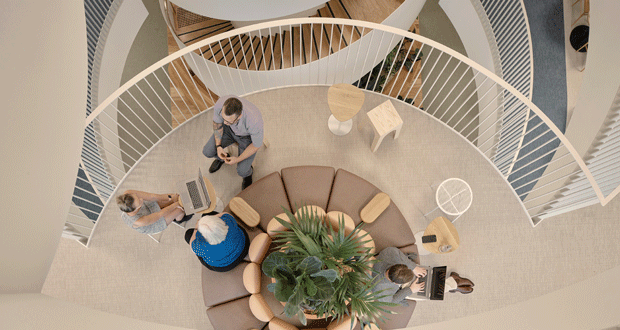New research has found that companies that have made a change to their offices and way of working since the pandemic have a 17 per cent higher satisfaction score among employees than those that haven’t.
The report titled ‘Great Adaptations – 2023 Workplace Futures Survey’ is the fourth edition of international design practice Hassell’s annual Workplace Futures Survey, which this year interviewed 3,500 office workers across Australia, China, including Hong Kong, Singapore, the United States, the United Kingdom, Belgium and the Netherlands.
The survey and report uncover valuable insights into the current state of the workplace and what it takes to create the ideal hybrid office. The report paints an overall picture of the return to work, showing that office-based work is on the rise in 2023, led by employees voluntarily returning to high-performing offices with some regionally specific differences.
Hassell Senior Researcher and report author Dr. Daniel Davis commented: “Countries and cities, which have had the longest periods of dealing with pandemic-era lockdowns including the US, UK and Melbourne in Australia are home to the largest number of ‘reluctant returners’ — employees who prefer working from home over coming into the office.”
Further findings show that employers are unlikely to gain leverage over workers in an economic downturn. The rise of hybrid working – where people split their work week between home and office spaces – is now an anticipated perk in cities around the globe. But despite the threat of recession and a tightening labour market many who fear job security are still choosing to work from home more often.
Davis added: “The report challenges some areas of emerging consensus — particularly that if you fear losing your job, you’d be in the office more to prove your value to your organisation but across many regions worldwide that’s not the case.”
Among the report’s key findings are:
- More people are working from the office this year. The number of people working from home full-time is declining and the numbers working from the office is increasing, while hybrid remains stable.
- Companies that have made a change to their offices and ways of working since the pandemic have a 17 per cent higher satisfaction score among employees than those that haven’t. Companies are making a wide range of changes to their offices. There isn’t one universal change that all companies are making. It depends a lot on a company’s management style, growth trajectory and industry.
- One of the most desirable office amenities: a vibrant city. People want to work in places connected to great amenities. The most desirable amenities are grocery stores, green spaces, and good coffee.
- In a downturn, people might not return to the office. We assumed that in a downturn, employers would have more leverage to get people back to the office. In our study, this doesn’t appear to be the case.
- Human resources departments and real estate need to work more closely together. In many companies, different departments are responsible for workplace policies and workplace design. As workplaces go through major upheavals post-pandemic, our research shows that the most effective companies change both things in tandem.
Great Adaptations – 2023 Workplace Futures Survey report also reveals the specific features people want most from their place of work in 2023.
In a nod to a preference for convenience and wellbeing, grocery stores and green open spaces near workplaces have emerged as primary incentives drawing individuals back to the office. The availability of free food and convenient access to public transport also ranks highly, revealing a close alignment with employees’ desire to curb expenditure amid the rising cost of living. In order of preference, the top six most popular features are:
- Free lunch and food
- Gardens and green spaces
- Good coffee
- Fresh air
- Good food and retail nearby
- Enough space to focus without distraction
According to Davis, the key to crafting an exemplary hybrid workplace extends beyond one specific amenity. While these factors are attractive, businesses need to employ a range of strategies to cater to the multifaceted needs and preferences of their workforce.
Davis said: “In this era of hybrid work, companies can’t afford to wait for economic conditions to change. They need to be getting the basics right — something that many offices fail to do — by providing the right spaces for collaborative and focused work. And they need to stack and aggregate a variety of amenities that not only address the unique requirements of different individuals but also cultivate an atmosphere of inclusivity and engagement.
“The implementation of a well-rounded array of offerings paves the way for an enriched hybrid workplace experience that transcends conventional expectations. By publishing this report, we hope to provide answers to creating a great adaptation — a flexible workplace and an appealing culture and working environment.
“And while we can see a link between changes to offices and higher satisfaction, the most effective investments happen in tandem with updating policies to match new employee expectations.”





